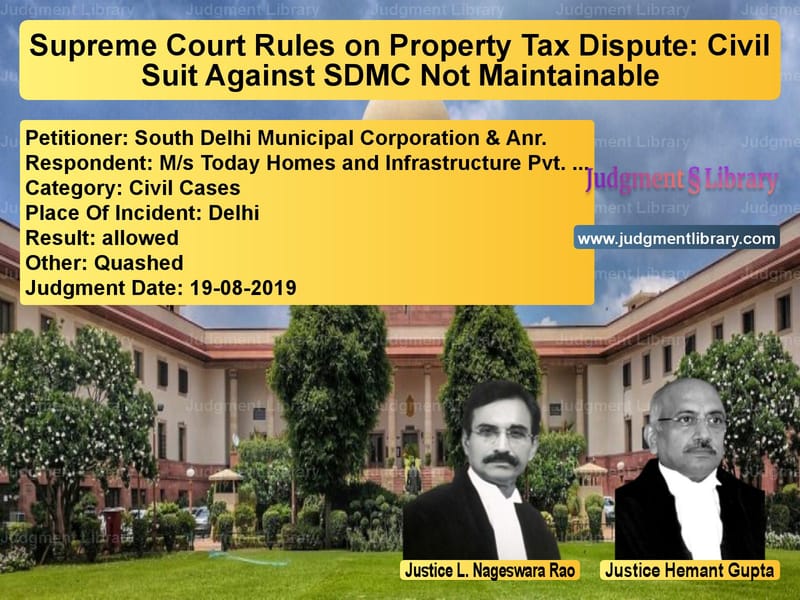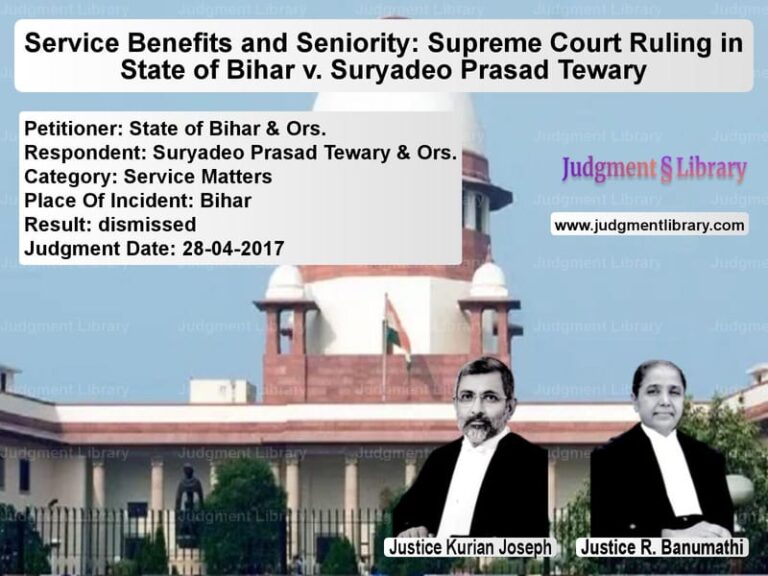Supreme Court Rules on Property Tax Dispute: Civil Suit Against SDMC Not Maintainable
The Supreme Court of India, in its judgment dated August 19, 2019, ruled on the maintainability of a civil suit challenging a property tax assessment issued by the South Delhi Municipal Corporation (SDMC). The case, South Delhi Municipal Corporation & Anr. v. M/s Today Homes and Infrastructure Pvt. Ltd., examined whether a civil suit challenging the validity of property tax assessment is maintainable when a statutory remedy exists.
The Supreme Court held that the civil suit was not maintainable and reiterated that when a statute provides an adequate and effective remedy for redressal, parties must first approach the prescribed forum instead of filing a suit in a civil court.
Background of the Case
The dispute arose when the SDMC issued a demand notice for property tax against M/s Today Homes and Infrastructure Pvt. Ltd. (hereinafter, “Today Homes”). The company, instead of challenging the assessment before the Municipal Taxation Tribunal under Section 169 of the Delhi Municipal Corporation Act, 1957 (“the Act”), filed a civil suit before the Delhi High Court, questioning the validity of the demand.
The Single Judge of the High Court ruled that the civil suit was not maintainable and dismissed the plaint. However, the Division Bench allowed the appeal, holding that where a statutory remedy is “onerous or inadequate,” a civil suit could still be entertained.
The SDMC, aggrieved by the Division Bench’s ruling, filed an appeal before the Supreme Court.
Petitioner’s Arguments (South Delhi Municipal Corporation)
The SDMC, represented by its counsel, argued:
- Existence of a Statutory Remedy: Section 169 of the Act provides an appellate remedy before the Municipal Taxation Tribunal for challenging tax assessments.
- Civil Suits Are Barred: The presence of a statutory remedy implies a bar on civil court jurisdiction unless fundamental rights are violated.
- Reliance on Precedents: The Corporation cited NDMC v. Satish Chand, where the Supreme Court held that statutory tax assessments should be contested only before the designated authority.
Respondent’s Arguments (M/s Today Homes and Infrastructure Pvt. Ltd.)
The respondents opposed the appeal, arguing:
- Onerous and Inadequate Remedy: The statutory appeal requires full payment of the tax amount before filing an appeal, making it “onerous.”
- Civil Courts Retain Jurisdiction: They contended that when a remedy is unduly burdensome, civil courts can intervene.
- Violations of Legal Principles: The respondents alleged that the assessment was arbitrary and unconstitutional.
Supreme Court’s Observations
The Supreme Court analyzed the legislative framework and judicial precedents and made the following key observations:
1. Civil Court’s Jurisdiction is Barred if a Statutory Remedy Exists
The Court reaffirmed that where a special statute provides an appellate remedy, the jurisdiction of civil courts is impliedly barred. It stated:
“The Delhi Municipal Corporation Act, 1957, provides a comprehensive remedy for tax disputes, leaving no room for intervention by civil courts.”
2. Adequacy of the Statutory Remedy
The Supreme Court rejected the argument that requiring pre-deposit before an appeal made the remedy inadequate, holding:
“The presence of a financial condition in the statutory remedy does not render it inadequate or illusory.”
3. Precedents on Exclusion of Civil Court Jurisdiction
The Court relied on the landmark ruling in Dhulabhai v. State of Madhya Pradesh, where it was held that if a statute creates a right and provides a mechanism for its enforcement, civil courts’ jurisdiction is barred.
4. No Fundamental Violation Alleged
The Court noted that there was no violation of fundamental rights warranting interference by the civil courts.
Final Verdict
The Supreme Court allowed the appeal, setting aside the Division Bench’s order and restoring the Single Judge’s ruling. The Court held:
- The civil suit was not maintainable.
- The respondent must approach the Municipal Taxation Tribunal under Section 169 of the Act.
- The appellate remedy provided in the statute is adequate and must be exhausted before seeking judicial intervention.
Impact of the Judgment
This ruling has significant implications for tax litigation and municipal governance:
- Reaffirming Tax Jurisdiction: The ruling strengthens municipal authorities’ power to enforce tax assessments without unnecessary judicial intervention.
- Limiting Civil Court Intervention: Courts will now be less likely to entertain tax-related civil suits when statutory remedies exist.
- Ensuring Legal Certainty: The decision provides clarity to businesses and property owners on the appropriate forums for challenging tax demands.
Conclusion
The Supreme Court’s ruling in South Delhi Municipal Corporation v. M/s Today Homes reinforces the principle that statutory remedies must be exhausted before resorting to civil litigation. By dismissing the civil suit and directing the respondents to the Municipal Taxation Tribunal, the Court has upheld the integrity of statutory dispute resolution mechanisms, ensuring a streamlined process for tax-related disputes.
Petitioner Name: South Delhi Municipal Corporation & Anr..Respondent Name: M/s Today Homes and Infrastructure Pvt. Ltd..Judgment By: Justice L. Nageswara Rao, Justice Hemant Gupta.Place Of Incident: Delhi.Judgment Date: 19-08-2019.
Don’t miss out on the full details! Download the complete judgment in PDF format below and gain valuable insights instantly!
Download Judgment: South Delhi Municipa vs Ms Today Homes and Supreme Court of India Judgment Dated 19-08-2019.pdf
Direct Downlaod Judgment: Direct downlaod this Judgment
See all petitions in Tax Refund Disputes
See all petitions in Public Sector Employees
See all petitions in Contract Disputes
See all petitions in Judgment by L. Nageswara Rao
See all petitions in Judgment by Hemant Gupta
See all petitions in allowed
See all petitions in Quashed
See all petitions in supreme court of India judgments August 2019
See all petitions in 2019 judgments
See all posts in Civil Cases Category
See all allowed petitions in Civil Cases Category
See all Dismissed petitions in Civil Cases Category
See all partially allowed petitions in Civil Cases Category







